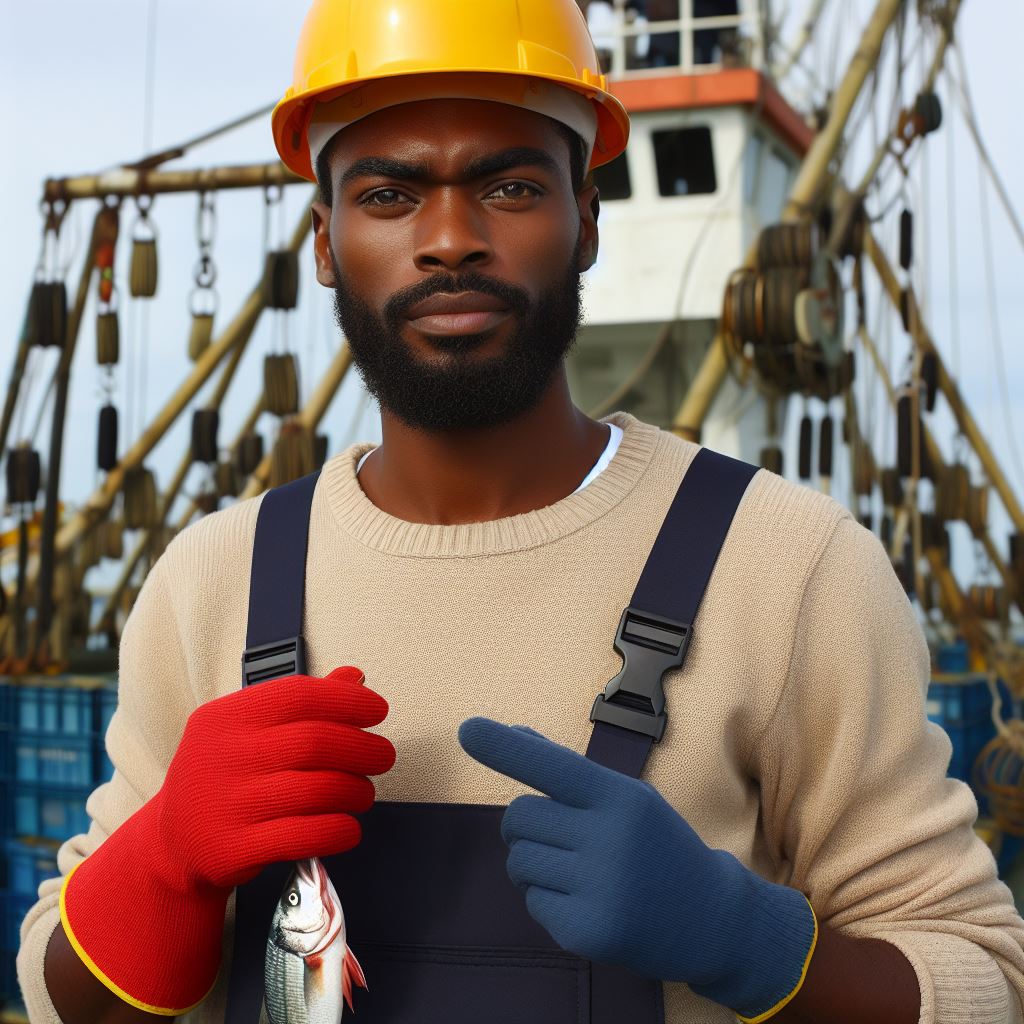Introduction
Scholarships and funding for fisheries students in Nigeria play a crucial role in ensuring the growth and development of the fisheries sector in the country.
Providing financial support allows students to pursue their education and research, leading to innovation and advancements in the field of fisheries.
These scholarships and funding opportunities also enable students to overcome financial barriers and access quality education, ultimately contributing to the overall development of the fisheries industry in Nigeria.
Moreover, by investing in the education of fisheries students, the government and other organizations are creating a skilled workforce, equipped with the necessary knowledge and tools to address the challenges faced by the sector.
Additionally, scholarships and funding encourage more students to pursue studies in fisheries, creating a pool of talented individuals who can drive sustainable growth and conservation efforts.
Without scholarships and funding, many bright and deserving students would be unable to afford education and contribute to the development of the fisheries industry.
In the following sections, we will explore the various scholarships and funding opportunities available to fisheries students in Nigeria.
Overview of Fisheries Education in Nigeria
Background information on fisheries education in Nigeria
- Fisheries education in Nigeria plays a vital role in the development of the fishing industry.
- Nigeria, being a coastal country with abundant water resources, offers great potential for fisheries education.
- Several universities and colleges in Nigeria offer fisheries programs, both at undergraduate and postgraduate levels.
- These programs aim to equip students with the knowledge and skills necessary to excel in the field of fisheries.
- Students learn about fishery biology, aquaculture, fishery management, marine ecology, and related areas.
The challenges faced by fisheries students in the country
- Despite the importance of fisheries education, students in Nigeria face various challenges.
- One major challenge is the limited availability of scholarship and funding opportunities.
- Many students come from disadvantaged backgrounds and struggle to afford the high cost of education.
- Without financial support, talented and deserving students may be unable to pursue their education in fisheries.
- Lack of funding often leads to a low enrollment rate and hinders the growth of the fisheries sector.
- Inadequate infrastructure and outdated equipment in some educational institutions further impede student learning.
- Insufficient facilities make it difficult for students to gain practical experience, limiting their professional development.
- Furthermore, a lack of industry linkages and internship opportunities limits students’ exposure to real-world situations.
- Without such experiences, students may struggle to relate their theoretical knowledge to practical applications.
- Additionally, the dearth of qualified faculty poses another challenge for fisheries education in Nigeria.
- There is a need for more experienced and competent instructors who can provide quality education to students.
Overall, despite the potential for fisheries education in Nigeria, there are significant challenges that need to be addressed.
Efforts must be made to provide scholarships and funding opportunities to deserving fisheries students.
Improvements in infrastructure, equipment, and industry linkages are also necessary to enhance the learning experience.
With these measures, Nigeria can establish a strong fisheries education system, producing skilled professionals and contributing to the growth of the fishing industry.
Read: Evolution of Fisheries Studies in Nigeria: A History
Types of Scholarships and Funding Available for Fisheries Students in Nigeria
Government Scholarships
- Description and eligibility criteria for government scholarships in fisheries: Government scholarships in fisheries are financial aids provided by the Nigerian government to students pursuing fisheries education. These scholarships are primarily offered to Nigerian citizens who demonstrate exceptional academic performance and financial need.
- Examples of government scholarship programs for fisheries students: Some examples of government scholarship programs available for fisheries students in Nigeria are the Federal Government Scholarship Scheme (FSP) and the Nigerian Maritime University (NMU) Scholarship Program.
International Scholarships
- Description and eligibility criteria for international scholarships in fisheries: International scholarships in fisheries are grants or financial assistance provided by international organizations or foreign governments to Nigerian students pursuing fisheries education abroad. To be eligible, students are usually required to have excellent academic records and demonstrate a strong commitment to fisheries research and conservation.
- Examples of international scholarship programs available for Nigerian fisheries students: Some examples of international scholarship programs specifically available for Nigerian fisheries students include the Australian Awards Scholarships, the Master’s Scholarship Program by the Norwegian Government, and the Swedish Institute Study Scholarships.
Private Scholarships
- Description and eligibility criteria for private scholarships in fisheries: Private scholarships in fisheries are financial aids provided by private organizations, companies, or individuals to support students pursuing fisheries education in Nigeria. Eligibility criteria may vary depending on the scholarship, but it often considers academic excellence, financial need, and personal achievements related to fisheries.
- Examples of private scholarship programs specifically focused on fisheries education: Some examples of private scholarship programs specifically targeted towards fisheries education in Nigeria include the Nigerian Conservation Foundation (NCF) Scholarships and Grants and the Chevron Nigeria Limited JV University Scholarship Program.
Research Grants and Funding Opportunities
- Overview of research grants available for fisheries students: Research grants are monetary support offered to fisheries students to fund their research projects or studies in the field of fisheries. These grants aim to promote scientific research, innovation, and sustainable fisheries practices.
- Introduction to funding opportunities for research projects in fisheries: Funding opportunities for research projects in fisheries can come from various sources, such as government agencies, international organizations, private foundations, and research institutions. Students can apply for these opportunities to secure financial support for their research endeavors.
Read: Local vs. International: Fisheries Education Comparison

Tips and Guidance for Applying for Scholarships and Funding in Fisheries
Tips for writing an effective scholarship application
- Start early and gather all necessary documents and information.
- Read and understand the scholarship requirements thoroughly.
- Highlight your achievements, experiences, and skills relevant to fisheries.
- Write a personalized and compelling statement of purpose.
- Proofread and edit your application multiple times for grammar and spelling errors.
- Ask for feedback from mentors, professors, or professionals in the field.
- Submit the application before the deadline, keeping track of all required supporting documents.
- Follow any specific formatting instructions provided by the scholarship committee.
- Stay proactive and follow up with the scholarship provider regarding the status of your application.
- Be persistent and continue applying for other scholarships even if you receive rejections.
Guidance on preparing a strong research proposal for grant applications
- Thoroughly research the specific research interests and goals of potential grant providers.
- Create a clear and concise research question or hypothesis.
- Develop a detailed research methodology and plan that aligns with the grant requirements.
- Identify any potential challenges or limitations of your proposed research and propose solutions.
- Highlight your qualifications, experience, and skills pertinent to the research project.
- Provide a comprehensive budget, detailing how the grant funds will be utilized.
- Clearly demonstrate the potential societal and academic impact of your research project.
- Seek feedback from mentors or colleagues to improve the clarity and presentation of your proposal.
- Submit the proposal before the deadline, ensuring all required documents are included.
- Follow up with the grant provider to inquire about the status of your proposal if necessary.
Resources and options for seeking assistance in the application process
- Consult with your academic advisor or faculty members for guidance on scholarship applications.
- Visit the financial aid office at your university to explore available funding opportunities.
- Search for online databases and platforms that compile scholarships and grants for fisheries students.
- Join professional organizations and associations related to fisheries to access scholarship information.
- Seek out potential sponsors or mentors who can provide guidance and support in the application process.
- Consider attending workshops or seminars on scholarship applications and grant writing.
- Utilize online resources, such as sample scholarship essays and research proposal templates.
- Network with fellow fisheries students to learn about their successful scholarship application strategies.
- Reach out to previous scholarship recipients for advice and tips on the application process.
- Stay proactive and regularly check for new scholarship opportunities through various channels.
Read: Postgraduate Opportunities in Fisheries in Nigeria
Uncover the Details: Impact of Climate on Nigerian Horticulture
Success Stories and Testimonials of Nigerian Fisheries Students Who Received Scholarships and Funding
Real-life examples of fisheries students who benefitted from scholarships and funding
- Oluwaseun Adeleke, a third-year fisheries student at the University of Lagos, was awarded a scholarship from the Nigerian Fisheries Association.
- Chidinma Okafor, a graduate of the Federal University of Agriculture, Abeokuta, secured funding from the Federal Ministry of Agriculture for her postgraduate studies in fisheries.
- Emeka Nwosu, a fisheries student at the University of Port Harcourt, received a scholarship from an international donor organization to conduct a research project on sustainable fishing practices.
Their experiences, achievements, and the impact of the financial support on their education and career
Oluwaseun Adeleke, thanks to the scholarship provided by the Nigerian Fisheries Association, was able to concentrate on his studies without worrying about the financial burden.
He actively participated in various research projects, joining experienced professors in fieldwork and gaining practical knowledge.
This hands-on experience enhanced his understanding of fisheries management and improved his chances of securing a job in the field after graduation.
Chidinma Okafor, having received funding from the Federal Ministry of Agriculture, pursued her postgraduate studies with a focus on fish farm management.
She excelled in her research, developing innovative techniques for increasing fish productivity, which earned her recognition and a job offer from a leading aquaculture company even before completing her studies.
Emeka Nwosu’s scholarship from an international donor organization allowed him to delve into sustainable fishing practices, an area he was passionate about.
With the financial support, he conducted extensive research and collaborated with local fishermen to implement sustainable fishing techniques.
Emeka’s findings were published in a respected fisheries journal, establishing him as a promising young researcher in the field.
The scholarship not only facilitated his academic growth but also opened doors for further research opportunities and partnerships.
All three students, through scholarships and funding, experienced significant personal and professional growth, which had a lasting impact on their education and careers.
They were able to focus on learning, engage in practical experiences, and contribute to the advancement of the fisheries sector in Nigeria.
Furthermore, their success stories serve as inspiration for other fisheries students, demonstrating the potential positive outcomes of financial support.
Read: Nigerian Fisheries Graduates: Making a Global Impact
Conclusion
Scholarships and funding play a crucial role in supporting fisheries students in Nigeria.
It allows them to pursue their education without financial constraints, enabling them to focus on their studies and research.
Without scholarships and funding, many talented and deserving students may not have the opportunity to fulfill their potential in this field.
It is essential to recognize the importance of these financial resources and continue to support and expand scholarship programs.
By investing in the education of fisheries students, Nigeria can develop a highly skilled workforce for its fisheries industry.
Scholarships and funding also contribute to the overall growth and development of the fisheries sector in the country.
It is vital for aspiring fisheries students to actively seek out and explore the various scholarship opportunities available.
By researching and applying for financial support, they can alleviate the financial burden and focus on their education.
Organizations, government agencies, and universities in Nigeria are continually providing scholarships and funding options.
It is recommended that students proactively engage with these entities and submit their applications for financial assistance.
Through scholarships and funding, aspiring fisheries students can embark on their educational journey with confidence and determination.
Let us encourage all readers to explore the available opportunities and take proactive steps towards securing financial support for their fisheries education.
Transform Your Career with Expert Guidance
Get personalized mentorship consulting that’s tailored to your unique path. Our expert advice is actionable and exclusive.
Get Started



